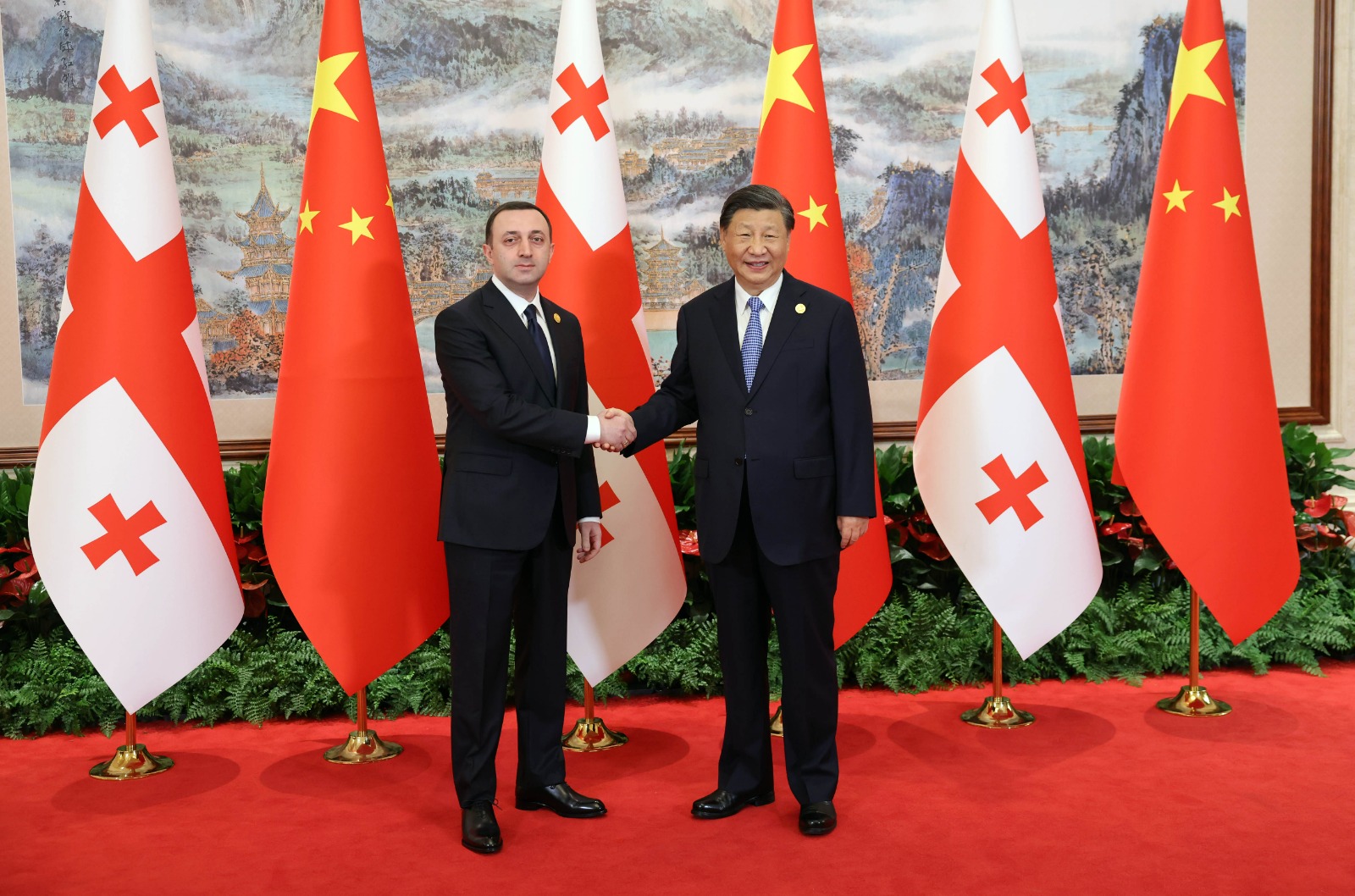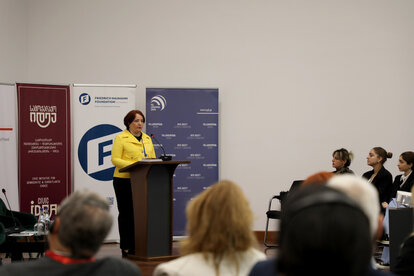China and Georgia
The Devil in the Details

Prime Minister of Georgia Irakli Gharibashvili Meeting with the President of the People's Republic of China Xi Jinping
© Official Press Release Photo of the Government of GeorgiaFollowing Georgian PM Gharibashvili’s visit to China and meeting with Chinese leader Xi Jinping at the end of July 2023, Sino-Georgian relations have been upgraded to a strategic partnership prioritising the deepening of bilateral relations in foreign affairs.
The Joint Statement[1], released by the government of Georgia contains several alarming narratives that tremendously influence not only the political but also the economic and soft power nature of the already established ties. It is making Georgia even more dependent on China, linking Georgia strategically to Beijing and shifting the Georgian foreign policy direction from West to East. Significantly, all this is happening while sharp anti-Western rhetoric by the Georgian government is growing day by day. Considering the specific model of China’s development and context, the Georgian government risks undermining the country's democratic development and Euro-Atlantic perspective by deepening cooperation with China, all while seeking to extend its power indefinitely.
It is symbolic that Georgia's interests are neglected in the very first paragraph of the document, where it is stated that the parties confirm their respect for the sovereignty, independence, and territorial integrity of all countries. It also says that Georgia “firmly adheres to the One China principle." One China is a cornerstone of Beijing’s diplomatic relations with the rest of the world. However, there are two narratives one needs to keep in mind in this context: There is the One China Policy, and there is the One China Principle. The first is the policy of acknowledging that there is only one Chinese government, as opposed to separate Chinese states such as the People’s Republic of China and the Republic of China (that is, Taiwan). Under this policy, countries consider the disputed territories of Tibet, Hong Kong, and Xinjiang to be inseparable parts of Mainland China. On the other hand, the One China Principle claims Taiwan will one day be reunified with mainland China. While most states recognize the One China Policy, there is significant silence on the part of the recognition of the One China Principle. Georgia unconditionally subscribed to the One China Principle without even asking for reciprocal recognition of Georgia's territorial integrity. In this context, it is to be remembered that the People's Republic of China typically abstains.[2] or votes against[3] UN resolutions call for the unconditional return of internally displaced persons (IDPs) from the occupied territories of Georgia.
Priorities under the economic domain contain another set of concerns. In particular, Georgia got a promise of preferential lending from Chinese banks for the implementation of social and infrastructure projects, as well as more cooperation “in the areas of transportation, communications, infrastructure modernisation, development and strengthening of the Middle Corridor, etc.” To echo this promise, one needs to recall PM Garibashvili’s long speech and propositions to the Chinese business community to build a new international airport in Tbilisi[4], the long-awaited Anaklia Deep-Sea port, and several hydroelectric power stations.

The former minister of defense of Georgia, Tinatin Khidasheli, speaking to the audience about Georgia-China strategic partnership during "Small States in the Changing World Order" international conference.
© Civic IdeaThe strategic cooperation goes even deeper into people-to-people cooperation. It promises the enlargement of cultural and educational programs, including further support for the development of Confucius Institutes (classrooms). When we read these seemingly harmless provisions, we must remember that we are talking about the People's Republic of China, ruled by the Communist Party, where academic freedom is limited, and all educational programs are subject to official censorship.
The international domain part of the statement could not be more problematic as it outlines the general principles of mutually beneficial cooperation under the UN and other international organisations. The language about “coordination and collaboration in regional and international affairs (…) (to) promote the establishment of a new type of international relations” goes against Georgia’s constitutional commitment to Euro–Atlantic integration.
Under the international domain chapter of the agreement, the government of Georgia commits itself to adhere to the
- One-China principle,
- Supports the BRI,
- Global Development Initiative (GDI),
- Global Security Initiative (GSI), and
- The Global Civilization Initiative (GCI).
Such a blank commitment from a country that has constitutionally established foreign policy priorities aimed at joining NATO and EU is highly irresponsible and vastly confusing. It's important to remember that these documents are designed to reduce the foreign political influence of the US and increase China's geopolitical sway. This mainly concerns Georgia as it threatens its strategic ties with the US, including American security assistance programs.
With the support of the Friedrich Naumann Foundation for Freedom and other international organisations, Civic IDEA brought much-needed experiences from all over the world to Tbilisi when it hosted the “Small States in a Changing World Order” conference with experts from over 29 countries, including the US, EU, Gulf, and Central Asian States, as well as Taiwan and Canada. The conference's central theme revolved around discussing strategies to safeguard small states against foreign influence operations, thwarting the encroachment of autocracies, and formulating impactful deterrence policies.
It is also important to note that the signing of the strategic partnership with China and reaffirming commitment to GSI is taking place against the backdrop of the fact that PM Gharibashvili did not attend the NATO Vilnius summit (2 weeks before his one week-long voyage to China). Before that, PM Gharibashvili made an appalling statement at the 2023 Globsec forum in Bratislava regarding Russia's decision to launch a full-scale invasion in Ukraine being "partly" motivated by Ukraine's NATO aspirations. In his statement, he was talking in line with the GSI’s 4th commitment to taking “legitimate security concerns of all countries seriously,” meaning NATO's open-door policy to be the legitimate security concern of Russia to be respected and understood.
A strategic partnership with Communist China, amid the ambiguous and harmful policies pursued by the Georgian government regarding NATO and the West in general, contradicts the country's strategic and foreign policy goals set by the Constitution and threatens national security.
Civic IDEA, as the leading organisation in Georgia investigating Chinese influence operations in the region, will actively observe and monitor events. Of course, diversification of foreign partners remains a priority for the country; however, at the same time, we are aware of the risks and misconduct related to Georgia’s cooperation with China in both infrastructure, economic, and educational sectors, which we have been widely investigating for five years. PM Gharibashvili's and former PM Ivanishvili’s sentiments towards Beijing, close ties with the Chinese elite, and work experience in a scandalous Chinese company, CEFC, were disclosed by us over the years, along with dozens of other mishandlings and abuse in Georgia-PRC relations. We will continue monitoring, reporting, and building resilience.
[1]See the Joint Statement of the People's Republic of China and Georgia on Establishing a Strategic Partnership: http://ge.china-embassy.gov.cn/eng/xwdt/202308/t20230807_11123383.htm
[2] See UNGA Adopting Georgia’s IDP resolution: https://civil.ge/archives/547105?fbclid=IwAR11qQZ8v38IDYCFO8gUgS_hRxyBVu4I7ZcK6SJVpvQyJUulgbUFjRth920
[3] See UNGA’s 2022 resolution on Georgia’s IDPs:
[4] See Georgia’s Prime Minister's speech at the China-Georgia Business Forum: https://www.gov.ge/news/363278
